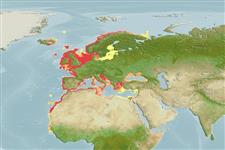Preferred temperature (Ref.
115969): 7.3 - 19.5, mean 10.7 (based on 788 cells).
Phylogenetic diversity index (Ref.
82804): PD
50 = 0.7656 [Uniqueness, from 0.5 = low to 2.0 = high].
Bayesian length-weight: a=0.00933 (0.00777 - 0.01121), b=3.02 (2.96 - 3.08), in cm Total Length, based on LWR estimates for this species (Ref.
93245).
Trophic level (Ref.
69278): 3.5 ±0.50 se; based on food items.
جهندگی (Ref.
120179): متوسط, كمينه زمان لازم براي دو برابر شدن جمعيت 4/1 – 4/4 سال (K=0.06-0.33; tm=2-8; tmax=30; Fec=230,000).
Prior r = 0.37, 95% CL = 0.25 - 0.56, Based on 10 full stock assessments.
Fishing Vulnerability (Ref.
59153): High to very high vulnerability (66 of 100).
Climate Vulnerability (Ref.
125649): Moderate to high vulnerability (47 of 100).
